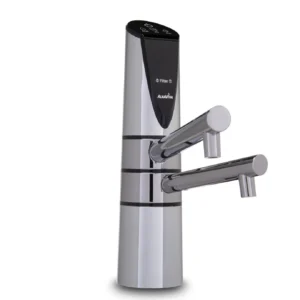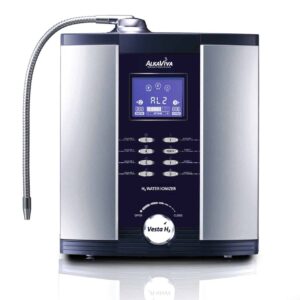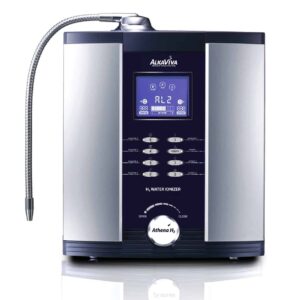Subtotal: 2.375,00 €
incl. VAT: 379,20 €

Do you want to choose the best water ionizer for you? One that gives you the best performance at the right price? Then you must distinguish the truths about water ionizers from the “myths” that surround them.
As in any other field, there are certain “myths” in the field of water ionizers. Some misinformation is presented often enough by certain sellers to be considered real. This can put you in two unwanted situations:
In both cases, the lack of information or even misinformation can lead you to make less successful choices, the result of which in time is not the expected one.
Buying a water ionizer is an important investment, through the benefits it has for your health and that of your family. That’s why we offer you well-documented information to help you make the best choice, with an optimal quality-price ratio.
You will often hear the statement: the “X” ionizer has larger electrodes than the “Y” ionizer, which means it is better. See below why this statement is FALSE.
Electric water ionizers produce ionized alkaline water through an electrolysis process. In the electrolysis chamber there are several electrodes on which a current of a certain power is applied, which leads to obtaining an alkaline water with a certain pH (alkalinity) and ORP (redox potential).
The voltage and intensity of the current applied to the electrodes are one of the factors that influence the pH and ORP of the water obtained. But high power is not enough to get the best pH and ORP. On the contrary, a higher power applied to the electrodes has certain disadvantages.
The pH and ORP of ionized alkaline water produced by an ionizer depend on:
Ionizers that have more technologically advanced electrodes produce water with high pH and ORP, using a lower electrical voltage, so they need less power.
Higher power applied to the electrodes wears them out faster. More power means more heat, which causes the platinum layer on the surface of the electrodes to deteriorate faster. This leads to poorer performance over time and a shorter ionization chamber life.
You may find at some point that there are several types of ionized alkaline water, and that one type is superior to others. Is it true or not?
Alkaline ionized water has 3 measurable parameters that distinguish it from normal tap water, or even from a spring: higher pH, negative ORP and hydrogen concentration.
There are therefore three ways in which the quality of ionized alkaline water can be measured:
We can compare two alkaline waters according to these parameters and we can find differences, but both waters are ionized alkaline waters, only the values of some parameters differ.
For a water produced by an ionizer to be anything other than ionized alkaline water it should have something in addition to the three parameters above, another measurable parameter to differentiate it.
There are certainly differences in quality between water ionizers. There are better models and less efficient models. Models in premium ranges with high performance and high reliability are always more expensive than models with lower performance and / or reliability.
Make sure the ionizers you are comparing are in the same quality category. It is not relevant to compare, for example, an ionizer with iridium electrodes with one with platinum-plated titanium electrodes.
When comparing models of ionizers in the same quality category (eg premium range), it is useful to know what to look for so you can differentiate them.
The criteria you need to take into account when choosing an ionizer with an optimal quality / price ratio are discussed in detail in the article How to choose an ionizer.
It is just as important that the water you drink be both alkaline and ionized, but also as pure as possible. Its purity depends on how efficient the ionizer filters are.
Note: We refer here only to platinum-plated titanium electrodes. There are still ionizers on the market that use iridium electrodes, but
The more efficient the electrodes, the more water you will be able to obtain with a higher pH and higher negative ORP, with a lower current consumption.
An efficient self-cleaning system makes the ionizer to maintain its pH and ORP parameters over time, between two cleanings. Also, the more efficient the self-cleaning system, the less often you have to clean it manually, so your maintenance costs are lower.
It is preferable that the information about the filtration or ionization performance you receive can be confirmed with data from independent sources.
An extended warranty is a good indication of the reliability of the devices, and gives you the certainty that the manufacturer really believes in its products and will support you when needed.
The opinion of the dealer’s customers where you want to buy can also help you find out if the after-sales services are of good quality.
Now you are better informed to choose a quality water ionizer for you. If you have any questions about water ionizers, see also the article How to choose an ionizer.
Need more information? Ask a question using the contact form on the site, write to us at [email protected] or call one of the phone numbers displayed on the site. We will be happy to answer you.




